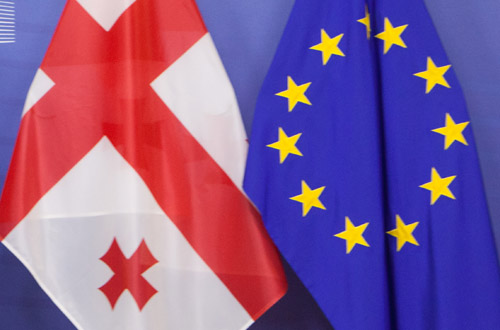
Georgia Between Russia and the European Union: Toward the Vilnius Summit and Beyond (Part One)
Publication: Eurasia Daily Monitor Volume: 10 Issue: 212
By:

Georgia’s Western orientation is the legacy of former president Mikheil Saakashvili’s government (2003–2012), which ended the predecessor governments’ equivocations. A tradition-bound society with almost no historical experience of Europe, very limited comprehension of European norms and values, and isolated during the past two centuries within the Russian and Soviet empires, was now being told by a young Westernized elite group in power that the country’s place is in Europe. For almost a decade, that incessant message, along with the government’s reforms and the magnetic attraction of Europe itself, generated overwhelming popular support for Georgia’s Western course, and opened the way toward an association agreement with the European Union.
The Georgian Dream government of Bidzina Ivanishvili (prime minister, November 2012–November 2013, succeeded by Irakli Gharibashvili—see EDM, November 4) inherited both the pro-Western national consensus and the reforms that qualified Georgia for association with the EU. The Georgian Dream government has adopted that heritage. It will initial the association agreement with the EU at the November 28–29 summit in Vilnius under the EU’s Lithuanian presidency, and expects the agreement to be signed and enter into force during 2014.
On the other hand, the Georgian Dream government came to power on a pledge to improve relations with a hostile Russia (see EDM, March 14, 2012). The two declared goals—advancing Georgia’s Western orientation while reducing tensions with Russia—are mutually contradictory. In the run-up to the Vilnius summit, the Georgian government clearly prioritizes the Western track over the Russian one.
Russia’s current policy objectives toward Georgia include:
• Precluding Georgia’s accession to the North Atlantic Treaty Organization (NATO), or any significant steps (e.g., a membership action plan) that would lead toward NATO accession. Perpetuating Georgia’s military vulnerability vis-à-vis Russian forces deployed in the occupied territories;
• Inducing Georgia to shift toward a “balanced,” two-vector policy;
• Shaping Georgian public opinion toward rebuilding economic and cultural ties with Russia based on the “common past”;
• Discouraging investments that would further develop oil and gas pipelines through the Azerbaijan-Georgia-Turkey corridor to Europe, particularly gas from Central Asia;
• Delaying the Kars-Tbilisi-Baku railroad project; promoting, instead, restoration of the railroad from Russia via Abkhazia and the rest of Georgia to Armenia; using this railroad as a transportation corridor in the event that Armenia completes its accession to the Russia-led Customs Union (see EDM, January 31, October 17);
• Laying the ground for Russian-Georgian joint business ventures in Georgia, so as to develop local interest groups vested in closer ties with Russia (see EDM, February 6);
• Restoring some form of diplomatic relations with Georgia even as Russia continues to occupy, “recognize,” and maintain diplomatic missions in Abkhazia and South Ossetia (see EDM, November 13, 2012);
• Devaluing Western verbal support for Georgia’s territorial integrity by perpetuating the Russian occupation, brazenly disregarding the West’s position. Waiting for Western fatigue to take hold on this issue, and inducing Georgia in due course to explore some “solution” with Russia. Ultimately, holding out the possibility of trading off Georgia’s Euro-Atlantic orientation for a Russian-approved pseudo-solution to the territories’ status.
In pursuit of those goals, Russia holds or is fashioning a range of economic and political instruments to exert leverage on Georgia:
• Visa and migrant labor policy: Given Georgia’s heavy reliance on labor remittances from Russia, the Russian government seeks political concessions in return for restoring visa-free travel of Georgian citizens to Russia. Thus, Moscow claims that visa-free travel is impossible as long as bilateral diplomatic relations are not restored and the embassies are not reopened. The intent is to pressure Tbilisi to abandon its own position of keeping diplomatic relations from being restored as long as Russia maintains “embassy”-level relations with Sukhumi and Tskhinvali.
Indeed, Moscow may eventually ask Georgia to accede to certain Commonwealth of Independent States (CIS) agreements (i.e., return to the CIS), as a condition to restoring visa-free travel for Georgian citizens to Russia and unimpeded access to the Russian market for Georgian products. Meanwhile, Russia’s citizens enjoy visa-free travel to Georgia, unilaterally granted by the allegedly “anti-Russian” United National Movement (UNM) government. Russia’s top negotiator with Georgia, Deputy Foreign Affairs Minister Grigory Karasin, made clear that Russia would move slowly on these issues when he met with his Georgian counterpart, Zurab Abashidze, for the fifth time since the launch of this format almost one year ago (Interfax, Civil Georgia, November 21).
• Market access: Following Georgia’s regime change, Russia lifted the politically motivated bans it had earlier imposed on Georgian grapes and other fruit, wines, and mineral water. Last month, Russia enlarged the list of fruit and vegetable produce allowed to enter the Russian market (Civil Georgia, October 11).
These steps are undoubtedly welcome to many Georgian producers, and politically helpful to the Georgian Dream government. In the longer term, however, reverting to dependence on the Russian market would slow down Georgian efforts to upgrade product quality to European Union standards (a lesson successfully learned by the Baltic States more than ten years ago). Moreover, access to the Russian market is unreliable due to Moscow’s political manipulation of this issue (see EDM, October 10, 11). If Russian companies establish joint ventures in Georgia to “ensure” the access of local produce to the Russian market, and Georgia becomes more reliant on Russian investments, then it might be a question of time until Russia begins applying pressures or inducements to Georgia to join the Russia-led Customs Union.
• Political influence: Moscow will probably encourage the growth of a pro-Russia political party, which will phrase its message as advocating a “balanced policy” for Georgia. The Kremlin openly promoted former parliament chairwoman Nino Burjanadze’s group for that role during the final years of the Saakashvili administration (see EDM, November 22). Burjanadze took third place in the October 2013 presidential election with 10 percent of the votes cast, behind Georgian Dream winner Giorgi Margvelashvili’s 62 percent and UNM’s Davit Bakradze’s 22 percent. Moscow will almost certainly seek to broaden the range of its political connections in Georgia beyond Burjanadze. It will probably also seek out business partners for Russian companies in Georgia, let such local partners grow rich and expect them to influence the country’s politics. Although Georgia will be initialing a Deep and Comprehensive Free Trade Agreement with the European Union in Vilnius, prospective international investments in Georgia at the moment are largely of non-EU origin (www.fund.ge, accessed November 24).
As in other ex-Soviet countries with multi-party competitive politics (e.g. Ukraine, Moldova), Russia will probably try to maneuver some Georgian politicians into demonstrating that they can manage relations with Russia more beneficially for Georgia than their local rivals could. Moscow will undoubtedly persist with courting the Georgian Orthodox Church, so as to cement a common front against Western influence on society. Influential elements in the Georgian Church share this perspective. Nevertheless, the Georgian Church will continue objecting to the Russian occupation of territories that it regards as Georgia’s.




